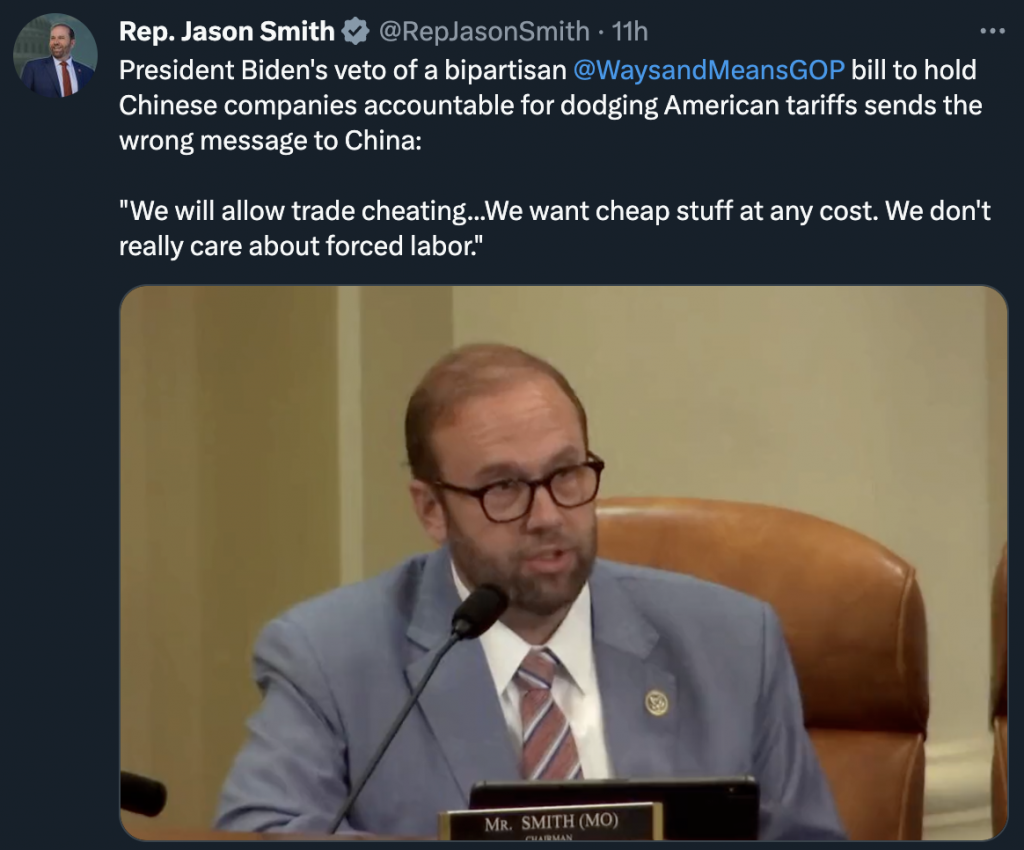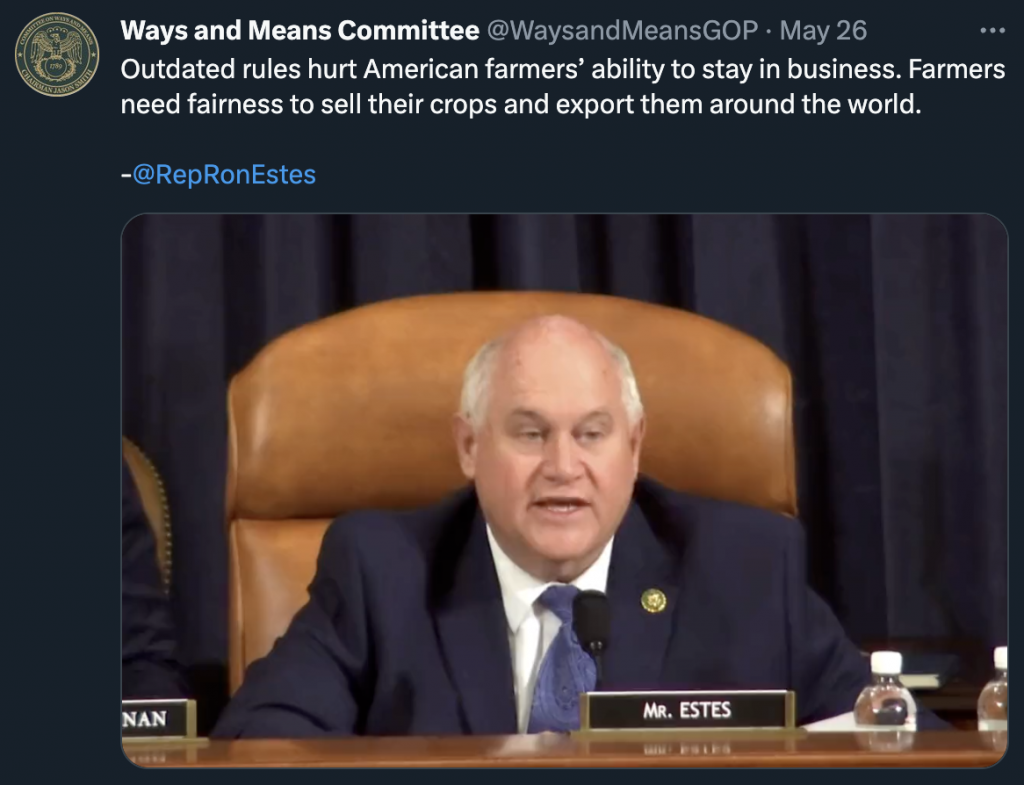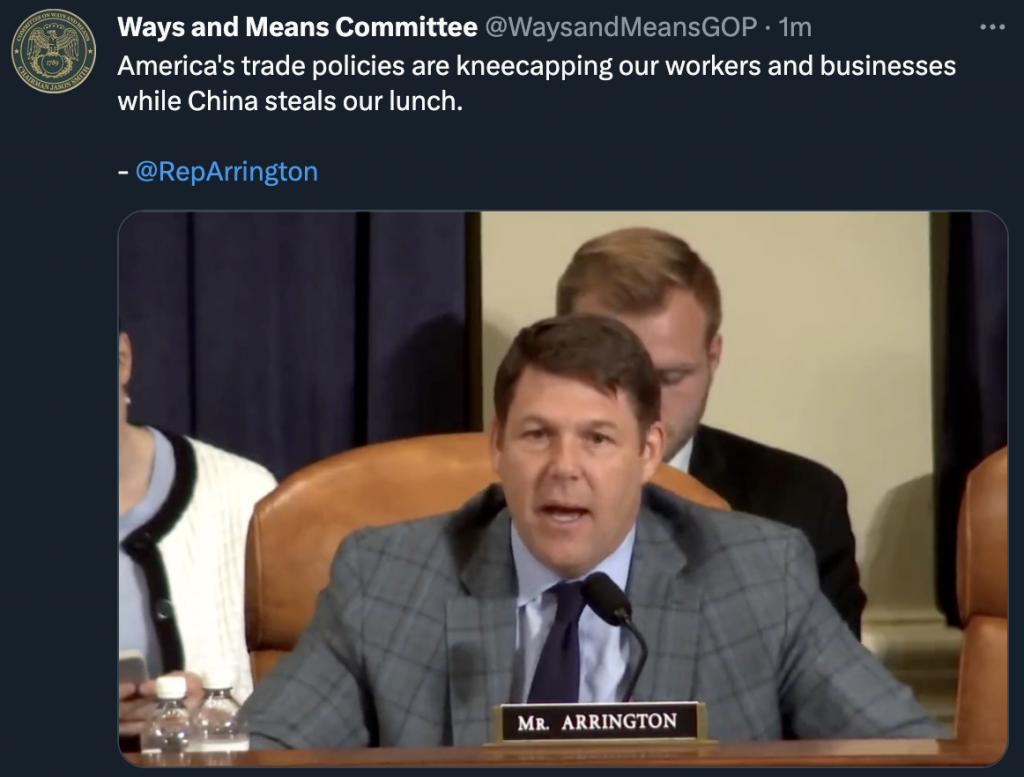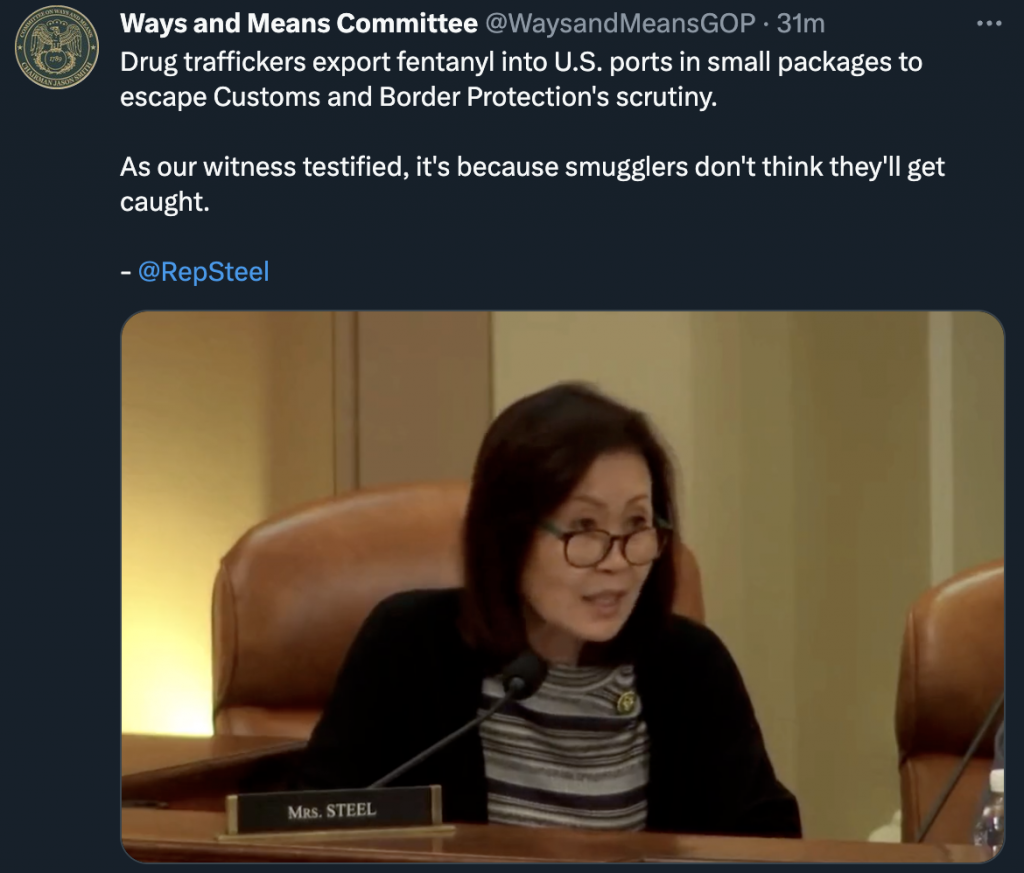Five Moments from Trade Subcommittee Hearing on Modernizing America’s Customs Policies to Protect American Workers and Secure Supply Chains
WASHINGTON, D.C. – At a Ways and Means Trade Subcommittee hearing on how the United States should modernize our customs policies, witnesses testified that our customs law should hold China accountable for unfair trade practices, root out forced labor in our supply chain, and equip Customs and Border Protection to combat illicit goods shipped through American ports while facilitating legitimate trade. Witnesses testified that effectively updating and enforcing U.S. law for all imports, including de minimis shipments, can stop illicit products such as those infringing American intellectual property or products made with forced labor from winding up in American stores and homes.
President Biden’s Veto of Resolution to Hold Chinese Companies Accountable Sends Wrong Message
President Biden’s veto of a bipartisan Resolution that would punish Chinese companies for dodging American tariffs on solar products sends the wrong message to the Chinese Communist Party, testified Michael Stumo to Ways and Means Committee Chairman Jason Smith (MO-08). Instead of standing up for American workers and manufacturers, President Biden’s veto gave a green light to Chinese companies to further avoid paying legally-owed tariffs to American taxpayers.
Chairman Smith: “The White House’s proclamation allowing imports of unfairly traded solar products from China into the U.S. was rejected by a bipartisan vote here in Congress actually in this Committee, as well. Unfortunately, the President vetoed that effort. What signal does the suspension of additional tariffs on China, when we know they are absolutely cheating, send to the Chinese Communist Party?”
Mr. Stumo: “It says that we will allow trade cheating. We want cheap stuff at any cost. We don’t really care about forced labor. We don’t care about dirty coal being used to make the panels that take 10 years of use to offset the dirty coal that went into them. That will allow a whack-a-mole game of them going to other countries, once we find subsidies, and allow them to circumvent. And by the way, this 24-month moratorium…is not temporary. It’s permanent, because they’re building wafer plants there in order to comply and not be found to circumvent later.”
Updating Customs Laws Helps Treat American Farmers & Ranchers with Fairness
Outdated customs laws can limit the opportunities for American farmers to compete and win in export markets. As Rep. Ron Estes (KS-04) pointed out, fair access to export markets around the world is a vital priority for American farmers and ranchers.
Rep. Estes: “I recently spoke with the Harvey County Farm Bureau, a group of highly motivated ag producers in one of the counties in my district, who made it clear that market access is one of the keys to helping them thrive, as well as trade enforcement and a robust workforce. Ms Smith, how will modernizing efforts support the trade efforts of farmers and ranchers in Kansas and across the country?”
Ms. Smith: “I believe that having customs regulations and procedures that reflect the way business is done by those ranchers and farmers who are looking to export and do it safely, securely, and compliantly, is easier when the rules are clear, the rules are as streamlined as possible, and that they can also expect that the government will enforce the laws that protect them from unfair competition.”
Rooting Out Forced Labor from America’s Supply Chain Starts with Transparency
In 2021, Congress passed the Uyghur Forced Labor Prevention Act to address the Chinese Communist Party’s systemic forced labor practices against Uyghurs and other ethnic minorities. Today, a significant portion of U.S. imports arrives via air cargo, yet data regarding such shipments is not available to the public. Chairman Smith highlighted that to enforce the law, Congress must start with knowing exactly what is being imported from foreign countries.
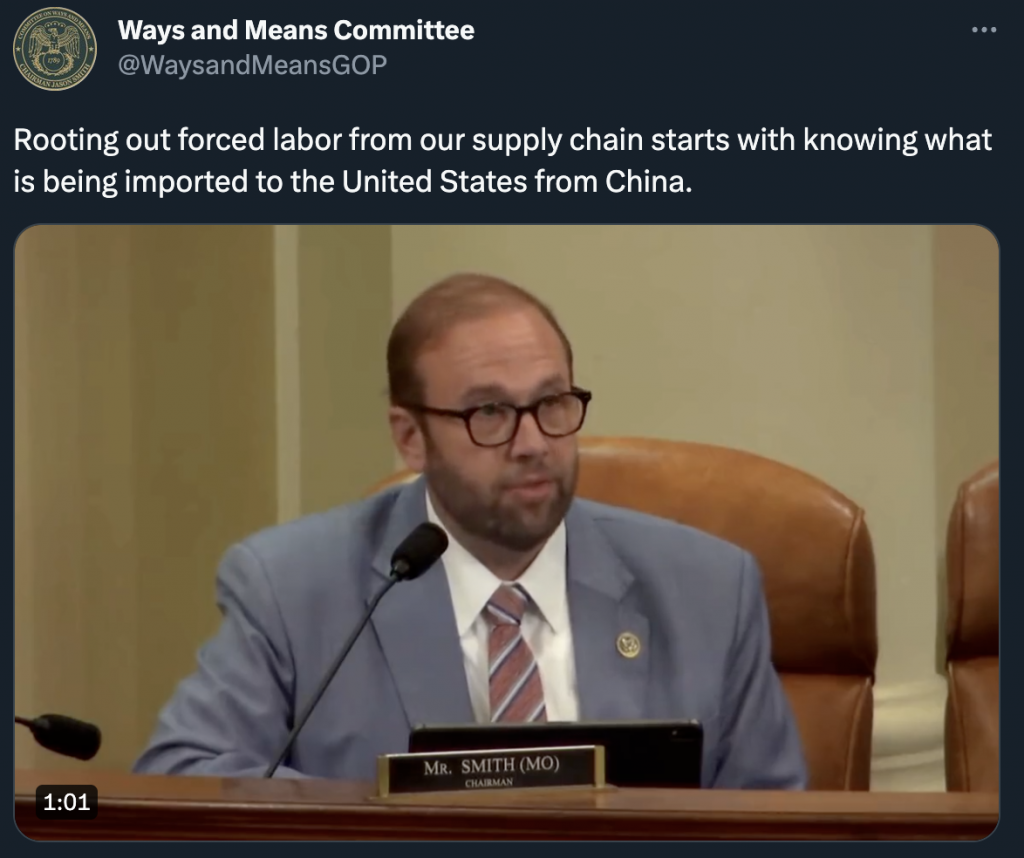
Chairman Smith: “In New York, we heard witness testimony about China’s human rights abuses and the fact that products produced by Chinese forced labor still make it to the U.S. market. What steps might Congress take to better enforce the Uyghur Forced Labor Prevention Act?”
Mr. Kanko: “In my view, it all starts with transparency. We’re flying blind on air cargo data, which makes up nearly half of the value of the products being imported into the U.S. Moreover, [it] makes up a huge percentage of high-value products that are associated with Uyghur forced labor. As resources might be reduced at CBP, that makes the case for transparency even stronger, because the public sector has a role in that enforcement process, identifying suspicious shipments or potentially bad actors in the supply chain. All we can see now is what’s coming in by ocean. We have this bizarre distinction between ocean and air when it comes to transparency.”
U.S.–China Trading Relationship is Not Reciprocal
China’s unfair trade practices have hurt American workers, farmers, and small businesses. House Budget Committee Chairman and Ways and Means member Rep. Jodey Arrington (TX-19) shined the light on ways China unfairly treats American businesses in our trading relationship, including stealing American intellectual property and shipping knockoffs to America using the de minimis provision.
Rep. Arrington: “What is our principle? What are our prevailing views? What are the goals we’re trying to achieve, because it’s not working…”
Mr. Stumo: “China’s totally nonreciprocal…In China, we can’t buy Chinese land. We can’t buy Chinese stock in Chinese companies. We can’t put our Lincoln Institutes into their universities. They put their Confucius Institutes in our universities…”
Drug Traffickers Smuggle Fentanyl Into U.S. Ports Using De Minimis Provision To Avoid Getting Caught
Drug traffickers smuggle illicit drugs like fentanyl through U.S. ports for distribution across America. Shipments sometimes arrive in small packages using the de minimis provision to avoid searches from Customs and Border Protection. In response to Rep. Michelle Steel (CA-45), witnesses testified drug traffickers take advantage of U.S. trade law because they don’t fear prosecution.
Rep. Steel: “What other tools can Congress give CBP to help target drug traffickers…?”
Mr. Stumo: “We’ve been talking about de minimis before but that’s exactly where a lot of this fentanyl is coming through. Ms. Smith, I did find some of your testimony actually from 2017 where you spoke to the Senate Finance Committee about a raid in New York…43 percent of the packages inspected were non-compliant, but they seized five pounds of fentanyl. Which I did the calculation is 2.2 million milligrams, which a few milligrams of fentanyl can kill. They found about 800 counterfeit goods and 1,300 other non-compliant imports. Forgive me for quoting you Ms. Smith, but it was a good quote; it’s a good statement. From Ms. Smith’s testimony – ‘Transnational criminal organizations are shipping illicit goods to the United States via small packages due to a perceived lower interdiction risk, and less severe consequences if the package is interdicted.’”

